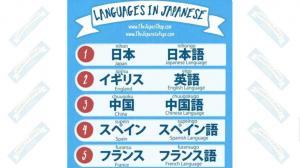In English we say “Japanese” and “Spanish,” but not “Germanese” or “Americanish.” In Japanese, saying language names is, in some ways, easier. In this article, we'll learn not only the names of countries, but the names of languages and the names of the citizens of those countries.
In many case, here's how to get the names of languages and people:
- Language names: [COUNTRY] + 語 go: 日本 nihon (Japan) | 日本語 nihongo (Japanese language)
- People names: [COUNTRY] + 人 jin: 日本 nihon (Japan) | 日本人 nihonjin (Japanese person)
Let's look at a few regular examples:
Regular Examples
日本 nihon Japan
日本語 nihongo Japanese
日本人 nihonjin Japanese person
スペイン supein Spain
スペイン語 supeingo Spainish
スペイン人 supain jin Spanish person
フランス furansu France
フランス語 furansugo French
フランス人 furansujin French person
ドイツ doitsu Germany
ドイツ語 doitsugo German (language)
ドイツ人 doitsujin German person
ロシア roshia Russia
ロシア語 roshiago Russian (language)
ロシア人 roshiajin Russian person
イタリア itaria Italy
イタリア語 itariago Italian
イタリア人 itariajin Italian person
韓国 kankoku (South) Korea
韓国語 kankokugo Korean
韓国人 kankokujin Korean person
中国 chuugoku China
中国語 chuugokugo Chinese (language)
中国人 chuugokujin Chinese person
Irregular Examples
The nationality stays the same. Just add 人 jin after the country's name.
英語 eigo English is used in:
イギリス igirisu England
アメリカ amerika America
カナダ kanada Canada
オーストラリア o-sutoraria Australia
ニュージーランド nyu- ji-rando New Zealand
etc.
ヘブライ語 heburaigo Hebrew or ヘブル語 heburugo Hebrew is used in:
イスラエル israeru Israel
ヒンディー語 hindi- Hindi is used in:
インド indo India
This, of course, is not a full list. Feel free to add other countries in the comments below.







this is good for improve Japanese language.